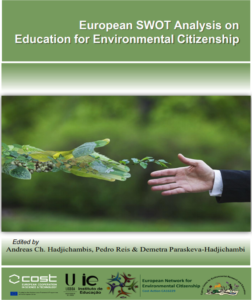Chapter 1: European Synthesis of SWOT Analysis for Education for Environmental Citizenship
Andreas Ch. Hadjichambis & Demetra Paraskeva-Hadjichambi
Abstract: This chapter attempts to present a European Synthesis of the views of experts in the area of education for the environment and sustainability in Europe, concerning the Strengths, Weakness, Opportunities and Threats (SWOT) of Education for Environmental Citizenship (EEC). A structured questionnaire was answered by 157 experts from 28 European countries. The participants were academics, researchers, teachers, Ministry of Education officers and NGOs. The views were processed through content analysis. EEC is perceived advantageous (Strengths) in three main dimensions: the first dimension refers to students’ personal development contributing to the enhancement of critical thinking, problem solving and decision making skills as well as in students’ empowerment for civic participation, intergenerational justice and action competence in the public sphere. The second dimension includes the importance of methodologies adopted which are integrated in a holistic and comprehensive pedagogy. Inherent to Education for Environmental Citizenship is the third dimension which is being able to address several Educational Outcomes. These empower individuals to take part in the democratic processes needed to respond to the sustainability imperative. Weaknesses and areas for improvement are identified from two main directions: internal – resulting from the attributes of Education for Environmental Citizenship, and external – resulting largely from the context in which Education for Environmental Citizenship should be employed. Despite the importance of Environmental Citizenship, it is considered until now by participants to be under-explored and not clearly defined and framed in relation to other types of Education. This leads to weaknesses at a number of levels ranging from the classrooms and teacher involvement up to the Educational System. The opportunities raised by the majority of participants relate to the holistic and comprehensive approach that could be developed by Education for Environmental Citizenship. In addition, a great opportunity of EEC is considered to be the empowerment of citizens for socio-political action in the private and public sphere regarding solving socio-environmental problems. National, European and global networking potential within Education for Environmental Citizenship was recognised by experts as a crucial opportunity for achieving environmental change. The European SWOT analysis allowed also the identification of some threats for EEC, 4 imposing however the difficulty to separate the threats from weaknesses. The majority of respondents emphasise the limitations that are derived from the context that Education for Environmental Citizenship should be applied from top (policy level) to bottom (the individual). The results reinvigorate the need to better conceptualise Education for Environmental Citizenship. Weaknesses, obstacles and areas for improvement relating to the novelty of Education for Environmental Citizenship are advocating the need for teachers’ education and motivation, the development of learning materials and best practices, as well as the mitigation of the educational system’s resistance to change.

